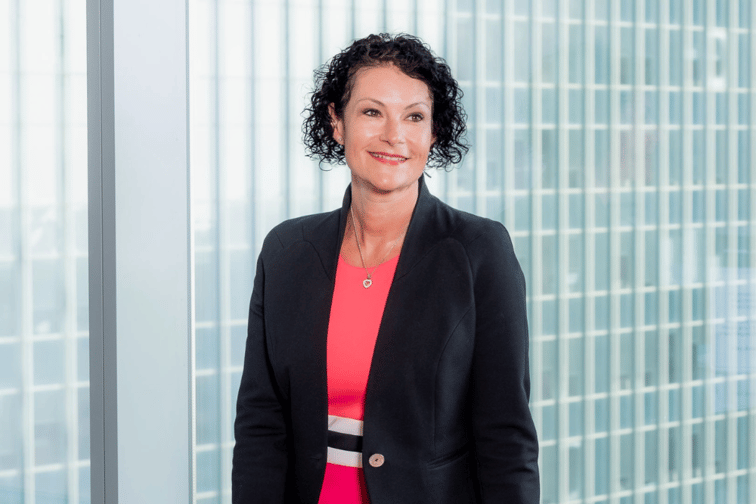

One positive outcome of the COVID-19 pandemic was the shift to focus on mental and physical health and avoiding burnout in the workplace. Addressing these particularly overwhelming moments and emphasizing vulnerability in the face of seismic social upheaval was important to strengthen morale and employee wellbeing. Specifically, women in leadership positions are finding themselves spearheading these issues to create a better work-life balance.
“I think the pandemic really caused people to pause and take a hard look at what it really means to be fatigued and to have all these different pressures culminating in different ways,” said Colette Taylor (pictured), COO of Sovereign Insurance, a Toronto-based commercial P&C specialist. “I’m really hopeful that we continue to evolve in our abilities to find balance between supporting people with mental health and wellbeing along the way.”
Taylor will join two other panellists and a moderator during the ‘Fighting fatigue – How to remain on top of your game’ panel at this year’s Women in Insurance Toronto conference. In advance of the event, Insurance Business spoke with Taylor about the different types of burnout, including the physical and mental elements. She also discussed her experiences overcoming feelings of exhaustion and what this conference signifies for women in the industry.
For many, experiencing fatigue can come as a surprise. “It can creep up on you when you least expect it,” she said.
When tending to various professional and personal obligations such as travelling for work, managing conflicting deadlines, nurturing young children or tending to sick elders, the increased physical strain of always being on the go can often go overlooked.
“We all tend to remediate the physical lag we’re experiencing with a quick fix like caffeine to try and trick our bodies into feeling energized and present,” Taylor said. “However, this is indicative of a much deeper problem that shouldn’t go unnoticed. Running around in circles without a time to decompress and centre yourself can be damaging.”
While the physical effects of burnout can be easier to ascertain when feeling consistently tired, its mental counterpart can be misdiagnosed as a normal part of work life.
“When you are constantly on the go, there are slower periods that may have you thinking that there are other things that need to get done, enabling you to spiral into this state of always having to feel useful,” Taylor said.
“This can culminate into an internal dialogue where you may not feel satisfied unless your agenda is overwrought with activity. Negative self-talk will lead you on a direct path to fatigue.”
Throughout her decades-long career in the insurance industry, Taylor, an New Zealand native, recalled experiencing fatigue many times. “I was once a single mom living in Canada without a strong support network,” she said.
“I have also always been driven to try and achieve more professionally, and in that quest, I can sometimes forget about my own health.”
Throughout time, Taylor has been able to become self-reflexive and search for purposeful fixes that can help nullify feelings of physical and mental exhaustion. “Being self-aware of the state of your body and mind is important,” she said.
“I have since given birth to another child and gotten married — I look to my more robust family network to help slow me down during moments of periods of demanding work obligations. When my husband sees that I have become jittery or agitated, he will be the first to recommend I close my laptop, turn off my phone and read a book to decompress, or I will spend quality bonding time with my children.”
However, everyone will have different preferences on how they choose to become more stabilized, what matters most is the ability to acknowledge defeat and work alongside loved ones or colleagues to remedy the situation.
“We can’t be afraid to ask for help when we need it, but ultimately, we must also pay attention and learn to accept that burnout is happening,” Taylor said.
The Women in Insurance conference celebrates the accomplishments of female insurance professionals as they continually diversify a particularly male-dominated industry. As the COO of Sovereign Insurance, Taylor oversees building and maintaining a successful team of professionals dedicated to developing strategic insurance propositions.
“I really enjoy being able to bring teams together and foster both individual and collective growth,” Taylor said.
Having attended previous years’ events, Taylor said that “being surrounded by other women and allies is energizing. We’re witnessing an evolution of promoting and supporting each other as women in the workplace.”
As women begin to assume more senior roles in the workplace, the attitudes towards one another have begun to shift. “It seems like we’re not at a place anymore where we are in competition with each other for very scant opportunities,” Taylor said. “Now, we can focus on uplifting each other and creating a productive and supportive environment, paying it forward to the newer generations of professionals entering the industry.”
Taking part in the conference is also an exciting opportunity for Taylor to share experiences with her peers while also creating a dialogue with the other panellists. “While there is a certain amount of security in going up and talking about numbers or industry forecasts, it will be especially rewarding to approach our job from a more vulnerable standpoint and show our humanity.” she said.
“I’m very excited to be a part of a panel with other women where we can riff off of each other’s opinions and insight to create a dynamic conversation.”
Find out more about the Women in Insurance Toronto event here.
